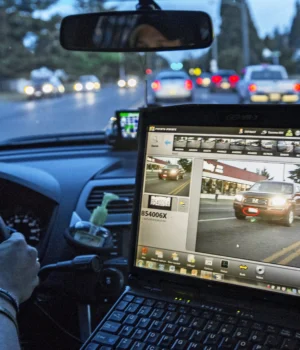Law Enforcement’s got a shiny new tool in its kit: Automatic License Plate Readers (ALPRs). These babies are stirring up quite a storm—popular and controversial all at once.
ALPRs are the high-tech eyes of the law, scanning plates faster than you can say “ride or die.” They’re not just for cops either; bounty hunters, repo-men, and even the auto industry are hooked, mining data day and night like modern-day prospectors. From catching crooks to managing traffic jams, ALPRs do it all. They’re like the Sherlock Holmes of the streets, sniffing out bad guys and missing wheels with near-perfect accuracy. And they don’t just stop at plates either; they’re working to collect images, dates, times, and even GPS coordinates. They’re a full-scale surveillance juggernaut.
Picture this: they’re clocking hundreds of thousands of plates an hour, snapping up images, dates, times, and GPS coordinates faster than you can hit the throttle. They’re not just reading plates; they’re painting a detailed map of your every move, tracking your groove from point A to B.While ALPRs are great for catching the bad guys, they’re also a privacy nightmare.ALPRs are building profiles, piecing together your journey like a detective working a cold case. Your wheels ain’t just transportation anymore; they’re a breadcrumb trail of your life.
And it’s not just talk; these ALPRs are everywhere. Mounted on poles, lurking on overpasses, or cruising in cop cars—they’re clocking every vehicle that passes, scanning databases for everything from stolen cars to expired insurance. ACLU and rights groups are roaring, calling out the indiscriminate snooping that turns our streets into a digital fishbowl. Homeland Security tried to corral this data into a monster federal database, but the backlash was loud and fierce. Critics continue to scream for regulations, fearing this tech will strip away our privacy like a desert wind through dust, – yet the laws are continuing to lag behind as ALPRs stake out every highway and byway.
Back in the day, cops hit the streets, eyeballing plates and cross-referencing with a hotlist scrawled on paper—slow and steady, but it got the job done. Enter ALPRs, and suddenly, what took a whole shift now zips by in seconds. No wonder law enforcement’s hooked.
While the Supreme Court laid down the law in 2012, demanding a judge’s nod for satellite tracking, plate scanners dodge those rules. They’re clocking your ride’s whereabouts multiple times daily, sliding under the radar with minimal checks.
But even the brass admit—they need solid rules on privacy and data hoarding. They need to spell out who snatches what data, when, and why. And don’t forget the audit—keep ’em honest, making sure those plates nail the crooks, not the carpoolers.
As you read this, thousands of plates are scanned, filed, and stored. ALPR tech’s getting cheaper, federal funds are flowing, and terrorists are in the crosshairs. But are we cool living in a world where this digital dragnet’s the norm? That’s the million-dollar question.
– Camille












